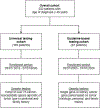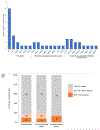Germline Variants Identified in Patients with Early-onset Renal Cell Carcinoma Referred for Germline Genetic Testing
- PMID: 34654685
- PMCID: PMC8688197
- DOI: 10.1016/j.euo.2021.09.005
Germline Variants Identified in Patients with Early-onset Renal Cell Carcinoma Referred for Germline Genetic Testing
Abstract
Background: Despite guidelines recommending genetic counseling for patients with early-onset renal cell carcinoma (RCC), studies interrogating the spectrum of germline mutations and clinical associations in patients with early-onset RCC are lacking.
Objective: To define the germline genetic spectrum and clinical associations for patients with early-onset RCC diagnosed at age ≤46 yr who underwent genetic testing.
Design, setting, and participants: We retrospectively identified patients with early-onset RCC who underwent germline testing at our institution from February 2003 to June 2020.
Outcome measurement and statistical analysis: The frequency and spectrum of pathogenic/likely pathogenic (P/LP) variants were determined. Clinical characteristics associated with mutation status were analyzed using two-sample comparison (Fisher's exact or χ2 test).
Results and limitations: Of 232 patients with early-onset RCC, 50% had non-clear-cell histology, including unclassified RCC (12.1%), chromophobe RCC (9.7%), FH-deficient RCC (7.0%), papillary RCC (6.6%), and translocation-associated RCC (4.3%). Overall, 43.5% had metastatic disease. Germline P/LP variants were identified in 41 patients (17.7%), of which 21 (9.1%) were in an RCC-associated gene and 20 (8.6%) in a non-RCC-associated gene, including 17 (7.3%) in DNA damage repair genes such as BRCA1/2, ATM, and CHEK2. Factors associated with RCC P/LP variants include bilateral/multifocal renal tumors, non-clear-cell histology, and additional extrarenal primary malignancies. In patients with only a solitary clear-cell RCC, the prevalence of P/LP variants in RCC-associated and non-RCC-associated genes was 0% and 9.9%, respectively.
Conclusions: Patients with early-onset RCC had high frequencies of germline P/LP variants in genes associated with both hereditary RCC and other cancer predispositions. Germline RCC panel testing has the highest yield when patients have clinical phenotypes suggestive of underlying RCC gene mutations. Patients with early-onset RCC should undergo comprehensive assessment of personal and family history to guide appropriate genetic testing.
Patient summary: In this study of 232 patients with early-onset kidney cancer who underwent genetic testing, we found a high prevalence of mutations in genes that increase the risk of cancer in both kidneys and other organs for patients and their at-risk family members. Our study suggests that patients with early-onset kidney cancer should undergo comprehensive genetic risk assessment.
Keywords: Early-onset renal cell carcinoma; Genetic counseling; Germline sequencing; Hereditary renal cell carcinoma syndromes; Kidney cancer.
Copyright © 2021 European Association of Urology. Published by Elsevier B.V. All rights reserved.
Figures




Comment in
-
Urological Oncology: Adrenal, Renal, Ureteral and Retroperitoneal Tumors.J Urol. 2022 May;207(5):1151-1153. doi: 10.1097/JU.0000000000002471. Epub 2022 Feb 14. J Urol. 2022. PMID: 35152713 No abstract available.
References
-
- Siegel RL, Miller KD, Jemal A. Cancer statistics, 2020. CA Cancer J Clin 2020;70:7–30. - PubMed
Publication types
MeSH terms
Grants and funding
LinkOut - more resources
Full Text Sources
Medical
Research Materials
Miscellaneous

